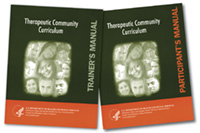Therapeutic Community Curriculum AvailableBy Riggin Waugh
 SAMHSA
recently released the Therapeutic
Community Curriculum training package to meet
the need for training entry-level staff in the basics
of the therapeutic community model of treatment. SAMHSA
recently released the Therapeutic
Community Curriculum training package to meet
the need for training entry-level staff in the basics
of the therapeutic community model of treatment.
The long tradition of community as a method of treatment
fosters personal growth by changing an individual's lifestyle
through a community of concerned people working together
to help themselves and each other.
Therapeutic communities have evolved to serve an ever-increasing
range of special populations with substance use disorders,
including women with children, older adults, adolescents,
people with co-occurring mental disorders, people with
HIV/AIDS, people who are homeless, and people involved
with the criminal justice system.
The newly released training package was developed in
response to a need for a document based on Therapeutic
Community principles. SAMHSA's Center for Substance Abuse
Treatment (CSAT) and a panel of experts met in 2000 to
provide guidance for the initial development of the curriculum.
Only experienced trainers who are familiar with the therapeutic
community treatment model should present the curriculum,
which is geared primarily toward clinical and nonclinical
staff working in a therapeutic community for the first
time.
The curriculum provides an understanding of the essential
components and methods of the therapeutic community model.
Its primary goals are to provide a common knowledge base
for all staff members working in these communities and
to encourage training participants to work on their professional
growth and development.
The package contains a trainer's manual, a participant's
manual that can be photocopied for each training participant,
and a CD-ROM with PowerPoint presentations for the modules.
The PowerPoint slides also can be printed and copied
onto overhead transparencies.
The trainer's manual includes general preparation instructions
and two appendices ("Ice Breakers" and "Positive
Visualizations") that are applicable to all modules.
In addition, each module includes detailed, session-specific
instructions for trainers; exercises for participants;
a module overview, including goals and objectives and
a content timeline; and the presentation. The participant's
manual includes the participant orientation, resource
sheets, module summaries, and a module review, which
functions as a learning assessment.
The curriculum comprises 11 modules designed to allow
for flexible delivery schedules. The complete in-service
training can be delivered over several consecutive days
or can be offered over the course of several weeks or
months. Each module also can be used separately to target
a specific training need. This learning approach includes:
A mixture of presentations, discussions, and exercises
to simulate the self-help and mutual self-help learning
processes used in therapeutic communities Frequent use of a static small-group exercise format Time for participants to reflect on and write their
thoughts and feelings in personal journals An assessment of learning to be completed by participants
in their small groups at the end of each session.
Participants who complete the training will experience
and understand the therapeutic community process through
participation in simulations and role-plays and will
experience an enhanced sense of belonging to a therapeutic
community. Although the curriculum is designed as an
entry-level training, it is not intended to take the
place of immersion or other clinical skills training
or ongoing clinical supervision.
The Therapeutic
Community Curriculum training package is available
free of charge from SAMHSA's National Clearinghouse for
Alcohol and Drug Information (NCADI), P.O. Box 2345,
Rockville, MD 20847-2345. Telephone: 1 (800) 729-6686
(English and Spanish) or 1 (800) 487-4889 (TDD for hearing
impaired). Ask for NCADI Publication No. BKD533 (trainer's
manual) or BKD534 (participant's manual). The curriculum
also can be downloaded from SAMHSA's KAP Web site at
www.kap.samhsa.gov. 
« See Also—Previous
Article
See Also—Next Article »
Back to Top
|




